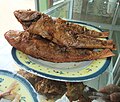Surakarta cuisine

About Solo's cuisine[edit]



In general, the cuisine of Solo is a combination of fried, coconut-milk based, and sweet-savory. Many of the dishes caters to vegan, and especially for Moslems (i.e. halal foods). Solo's culinary life is 24 hours, with some foodstalls starting to open at 2 a.m. and already closed at 5 a.m.
- National
- The national dishes of Indonesia includes fried rice (Nasi goreng), gado-gado, satay, and soto (chicken/beef soup) which varies in taste from city to city, and many of them have become common across South East Asia and beyond. As many as the dishes are the types of sambal (chilis), kerupuk (crackers), beverages, (sweet) soy sauce, and side dishes (like soy-based tempe and tofu). Rice is omnipresent in many forms (such as lontong, ketupat, porridge, etc), as well as tea and coffee. The drinks are usually sweet, but you can ask the drink to be sugarless, and you can choose between cold (ice cubed) or warm beverages. Some Indonesian fruit and vegetable dishes such as fruit rujak, gado-gado, karedok, pecel, lalab, capcay, tofu and tempeh are known as healthy foods with low fat and high fiber.
- International influence
- Other than traditional Javanese food, Surakarta's restaurants offers plethora of cuisines from around the world, thanks from hundreds of years of exposure from Indian, Chinese, and Western food, ranging from Indian currys (gulai and opor) and murtabaks, Chinese noodles, meatballs and its diverse cuisine, Spanish/Portuguese rissole and pastel, to Dutch poffertjes, pannekoek, spekkoek, rissole, kaastangel, klappertaart, and stroopwafels.
- Traditional
- The authentic traditional Indonesian home cooking is freshly made and consumed daily with minimal or no processed, canned or preserved foods, which means there are minimal amount of preservatives. Most ingredients are bought fresh early in the morning from local traditional markets, cooked around late morning and consumed mainly for lunch. The leftovers are stored in the cupboard in room temperature to be heated and consumed again for dinner. Traditionally, Indonesian dishes are rarely stored for long periods of time, thus most of these dishes are cooked and consumed in the same day or at most the following day.
- Beverages
- Solo's beverages mostly sweet and combines the richness of natural tropical fruits with coconut water or coconut milk, and other local ingredients. Because of Islamic dietary laws, most dining place do not offer alcoholic beverages, and only few licensed hotels and restaurants carry them. Other than national and international brand of beers, alcoholic beverage native to Solo is called ciu, which is a local adaptation of Chinese wine.
- Fruits
- Solo's markets abound with many types of tropical fruit. These are an important part of the Indonesian diet, either eaten freshly, or made into juices like avocado juice, desserts like es teler, processed in savoury and spicy dishes like rujak, fried like fried banana, cooked into cakes bika ambon, sweetened or salted and preserved such as manisan buah, or processed into crispy chips as snacks like jackfruit chips. Many of these fruits such as mangosteen, rambutan, jackfruit, durian, and banana, are indigenous to Indonesian archipelago; while others have been imported from other tropical countries. Today, strawberry, melon, apple and dragonfruit are introduced and grown in cooler highlands near Solo such as Tawangmangu, to mimic their native subtropics habitat.




Below are some of the famous dishes and snacks, and the appropriate time to eat them:
- Tahu kupat (breakfast or lunch): fried tofu, pressed rice pieces, noodles and roasted nuts
- fresh jackfruit (fruit)
- Nasi liwet (all day): Solonese style coconut rice with green papaya and stringy chicken. Because it is perisable food, foodstalls didn't open all day. Some open during the day, some only operates at night, and several even only open at dawn (2 a.m. onwards)
- Nasi gudeg (lunch or breakfast): chicken cooked with young jackfruits in coconut milk, served with eggs and cecek, and you can add chicken feet also
- chicken sate with lontong rice
- sate buntel: mutton sate wrapped in mutton fat
- rice with chilli eggplant, and tofu stewed in red curry
- fried tempe (side dish)
- serabi (snack): Solo pancakes made of coconut milk, mixed with a little rice flour as thickener. Srabi can be served plain, or with toppings such as sliced banana, chopped jackfruit, chocolate sprinkle (muisjes), or cheese.
- kue putu (snack): milled rice steamed with Javanese sugar and coconut in a bamboo tube
- javanese fried noodle
- Solonese meatball soup
- Solonese salad (selat): an adaptation of European cuisine into Javanese cuisine and taste. Beef, potato, carrot, lettuce, cucumber, onion, green bean, boiled egg, tomato with mustard served in thin soup made of sweet soy sauce and worcester sauce soup, topped with potato chips.
- fresh durian (fruit)
- Timlo: Solonese specialty chicken soup, with Solonese sausage (sosis), egg, and chicken innards side order
- Oxtail soup (breakfast, lunch): As the name said
- Sweetened quail eggs (side dish)
- Rendang (all day): Javanese curry dish
- Rawon (all day): diced beef in pitch-black soup
- Martabak (snack): Javanese murtabak
- Soto (all day): Chicken in spicy yellow turmeric soup, with rice vermicelli, egg, rice/lontong, vegetables, tomato, leeks and fried shallot.
- Tongseng (lunch) : a Javanese spicy and rather sweet goat (mutton) meat soup; a strongly-spiced curry of bone-in mutton, which is quickly stir-fried at the point of sale with vegetables added.
- Tengkleng (lunch): Another type of Javanese (innard) mutton soup, curry-style
- Nasi Tumpeng (a.k.a Nasi Kuning): uniquely Javanese cone-shaped yellow rice mound, served with dozens of side dishes.
- Sayur asem: Javanese-style vegetables in tamarind-flavored soup. Can be served hot or cold.
- Pecel ndeso (breakfast): an all vegetables food served with (sweet or chili) peanut sauce; a salad of boiled vegetables, dressed in a peanut-based spicy sauce. It is usually served as an accompaniment to rice. A peanut or dried fish/shrimp cracker (rempeyek) is served on the side
- Bakmi ketoprak:
- Cabuk rambak
- rujak
- Karak: Javanese crackers
- Gado-gado: akin to pecel, gado-gado means "mixed vegetables"; Similar to pecel, but includes different vegetables as well as boiled egg slices and a garnish of fish/shrimp crackers and emping (Gnetum gnemon L. nut, flattened, dried, and fried into small thin crackers) and also uses peanut sauce
- Bubur sambel goreng
- Swikee: Frogs' legs cooked in fermented soybean (tauco) soup.; Chinese-Javanese fusion cuisine
- Sayur Lodeh: assorted vegetable, stewed in coconut milk.
- Roti bakar: grilled bread: European-Javanese fusion cuisine
- Semur: from Dutch smoor
- (Bubur) Ketan hitam: black rice congee
- Bubur kacang hijau: mung beans porridge
- Bubur sumsum
- Lemper: glutinous rice with chicken meat inside, covered with banana leaf
- pastel: Pastry with (usually chicken or meat) casserole dish baked in a pie crust.
- Telur asin: Salted duck eggs
- Perkedel kentang: fried mashed potatoes
- Perkedel jagung: fried mashed corn
- Jagung bakar: grilled whole corn
- Mandarin cake: specialty layered cake from Solo, the most famous food gift from Solo
- Rempeyek



Special beverages and dessert:
- sweet Sumatran kopi susu (milk tea): an Indonesian version of Café au lait.
- kopi tubruk: coffee mixed with sugar and hot water and poured straight in the glass without separating out the coffee residue
- bajigur and bandrek: coconut milk or coconut sugar (gula jawa) based hot drinks, mixed with other spices
- Sekoteng: a ginger based hot drink which includes peanuts, diced bread, and pacar cina
- wedang jahe: hot ginger tea
- wedang ronde: A hot Javanese dessert containing glutinous rice balls stuffed with peanut paste, floating in a hot and sweet ginger and lemongrass tea.
- Angsle (warm drink): A hot soupy dessert of sago pearls, pre-cooked glutinous rice and mung beans, putu mayang (brightly-colored, noodle-shaped flour cakes), fried peanuts all drowned in hot, sweet coconut milk.
- Kembang tahu: a dessert made of tofu and ginger syrup
- Fruit juices (jus): orange (jus jeruk), guava (jus jambu), mango (jus mangga), soursop (jus sirsak) and avocado (jus alpokat), the last of these being commonly served with condensed milk and chocolate syrup as a dessert-like treat.
- es durian: durian based ice cream
- es kelapa muda: young coconut on ice
- es cincau: grass jelly
- es dawet
- es teler: avocado, jackfruit and coconut with shreded ice and condensed milk
- es kacang merah: red kidney beans
- es blewah: musk melon
- es rumput laut: seaweed
- herbal jamu
While most Indonesian grocery products and food served in mid to upperscale eating establishments maintain food hygiene standard ranges from good to acceptable, some warung traditional foodstalls and street vendors might have poor hygiene. The tropical microbes also might contribute to food poisoning cases, especially among foreigners during their stay in Indonesia. It is advisable to drink bottled or boiled drinking water, or choose cooked hot food instead of uncooked room temperatured one sold by street vendors. For example, when consuming food sold by street vendors, consuming hot cooked mi ayam or soto is much safer than having gado-gado or fruit rujak.
- Food and beverages that can be found in Solo
-
Indonesian version of Dutch w:Poffertjes
-
Spekkoek/Indische lekkernij ('bacon cake') - Indonesian layered 'pies' (lapis legit)
-
Klappertaart
-
Kaasstengels
-
Mandarin cake
-
Chicken satay (sate)
-
Indonesian chicken soup (soto)
-
Tempe, vegetarian substitute for meat because of its rich protein
-
Fried tempe and tofu (tahu)
-
Bacem (sweet and savory tempe)
-
Fried snacks
-
Pecel, vegetables
-
Sayur asem, another veggie based dish
-
Lodeh soup, veggie
-
Gado-gado, veggie dish
-
Rawon Setan (The Devil's Rawon). Other image: File:Rawon Setan.jpg
-
Chicken Soto. Other image: File:Soto Ayam home-made.JPG
-
Solonese Salad
-
Javanese cuisine
-
Chinese-Javanese fried noodle
-
Javanese noodle
-
Oxtail soup
-
Brown quail-eggs
-
Padang (West Sumatra) spicy foods restaurant that can be found anywhere in Indonesia
-
Fried fish
-
Local delicacies
-
Lemper
-
Fried corn
-
Peanut cracker
-
Serabi
-
Javanese-Chinese wonton soup
-
Steamed Chicken Rice, an Indonesian comfort food
-
Lontong cap go meh
-
Chili for fried dishes
-
Solo's sausage
-
Indonesian Rissole
-
Egg/salty martabak
-
Muisjes/sweet martabak a.k.a. terang bulan (moonlight cake)
-
Fried crab kwetiaw noodle
-
Pastel
-
A Sumsum Porridge
-
Mixed fruits: snakeskin fruit, rambutan, mango, pineaple, papaya, watermelon, starfruit, melon
-
Aqua brand bottled mineral water
-
Sugarless tea with sugar in sachets on the side
-
Sekoteng
-
Cendol
-
Grass jelly green cincau
-
Mixed ice
-
Pot tea
-
Es kelapa kopyor
-
Soda water with red syrup and condensed milk
-
Hot chocolate Milo
-
Street vendors selling orange juice, ice cendol, and ice coconut water in hot sunny day




















































